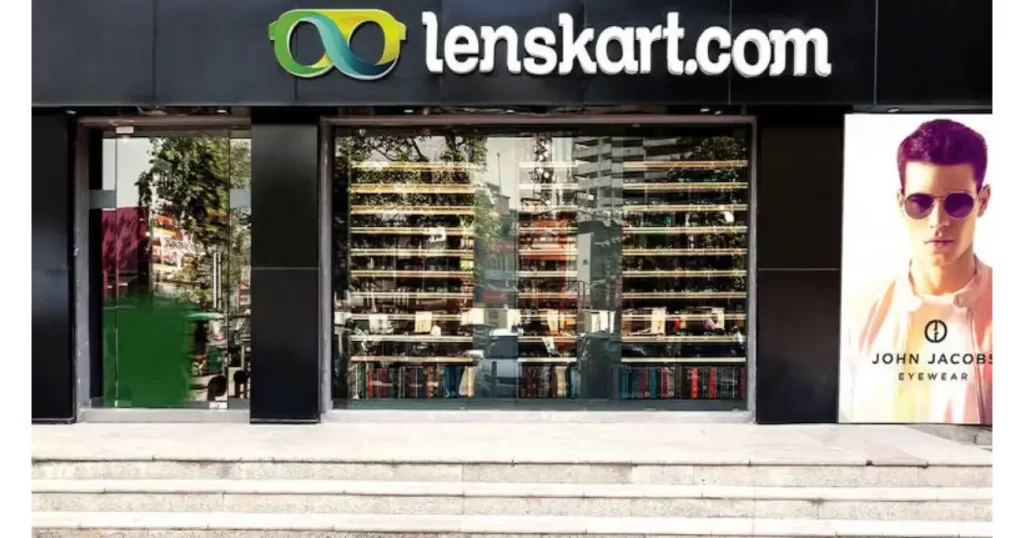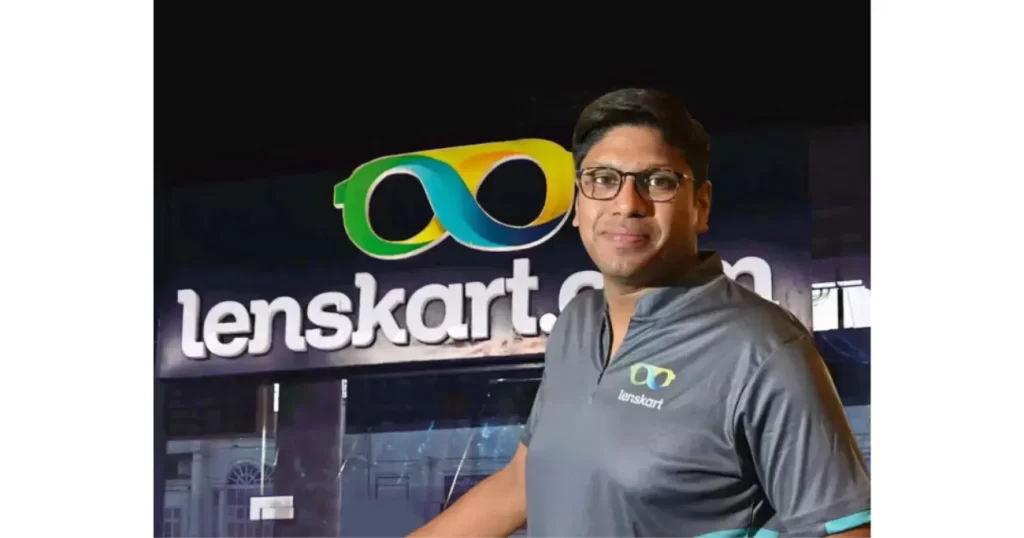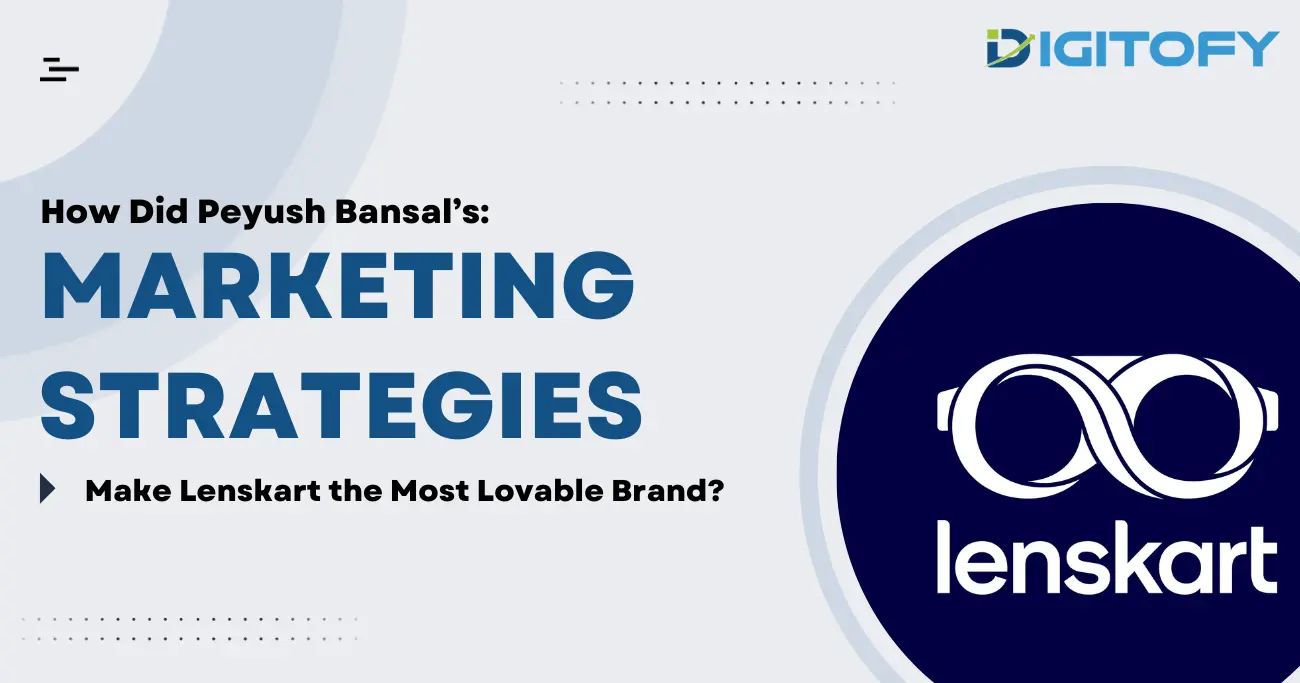How Peyush Bansal’s Marketing Strategies Made Lenskart The Most Lovable Brand?
Lenskart is one of India’s leading eyewear e-commerce companies, offering various prescription glasses, sunglasses, contact lenses, and more. Founded in 2010 by Peyush Bansal, Lenskart has increased over the past decade to become a household name in Indian online retail.
In this comprehensive blog post, we will analyze Lenskart’s innovative marketing strategies that have fueled its success. We will look at Lenskart’s target customer base, product range, pricing, distribution, and promotional tactics. We will also benchmark Lenskart against key competitors in the Indian eyewear market.
By the end, you will have a complete picture of how intelligent digital marketing and customer-centric policies have enabled Lenskart to dominate the online eyewear vertical in India.

About Lenskart
Lenskart is an Indian eyewear e-tailer that sells prescription glasses, sunglasses, contact lenses, and eye care products through its online portal Lenskart.com and mobile app.
- Founded in 2010 by Peyush Bansal
- Headquartered in Faridabad, Haryana
- Over 750 offline stores across India as of 2022
- Caters to over 7 million customers
- Offers over 10,000 styles of frames and sunglasses
- Delivers to over 19,000 pin codes in India
- Among the highest-funded eyewear startups in India, with over $322 million raised
Lenskart aims to disrupt the eyewear market in India by offering greater choice, lower prices, and better customer experience through omnichannel retail. The company innovates across the value chain, from designing trendy in-house brands to incorporating advanced 3D try-on technologies and optimizing lens production.
Also Read: No One Can Copy Baba Ramdev’s Marketing Strategy for “Patanjali” That Shook FMCG Industry
What is New with Lenskart?
Here are some of the latest developments at Lenskart in 2022:
- Launched NxtLens – its range of digital eyewear, including computer glasses, gaming glasses, and reading glasses
- Introduced Lenskart Vision Fund of $2 million to invest in startups innovating in eyewear and eye care
- Acquired Israel-based Glassique to gain expertise in 3D try-on technologies and expand global footprint
- Forayed into the Middle East by partnering with Apparel Group in UAE, Qatar, and other countries
- Ventured into Singapore through a JV with Singapore Eyewear Pvt Ltd
- Raised $266 million in Series G round at a $2.5 billion valuation
- Launched intelligent omnichannel platform Lenskart 6G to integrate online and offline customer journeys
- Partnered with Faridabad Police to provide free eye checkups and subsidized glasses for traffic personnel
These recent developments indicate that Lenskart is consolidating its position in India while expanding globally through partnerships, investments, and acquisitions. The company aims to serve 50 million customers in India and 100 million worldwide by 2025.
Also, Watch Our YouTube Shorts Video on Day-2 Peeyush Bansal’s Marketing strategy on Lenskart.
Buyer’s Persona
Understanding the target audience is crucial for creating effective marketing campaigns. Here are key highlights of Lenskart’s core target groups:
Students
- 15-25 years
- Tech-savvy, active on social media
- Lower financial bandwidth
- Fashionable and trend-conscious
- Higher susceptibility to eye strain and vision issues
- Purchase drivers: stylish designs, premium brands, discounts
Young Professionals
- 25-35 years
- Financial independence, mid-high disposable income
- Working long hours on digital devices
- Image-conscious and want to make a style statement
- Seek quality, customized products
- Purchase drivers: Brand reputation, convenient shopping experience, vision correction effectiveness
Middle-Aged Consumers
- 35-50 years
- Higher financial stability, seek value for money
- Vision correction needs due to aging vision
- Looking for functional, prescription glasses
- Less influenced by trends and brands
- Purchase drivers: Affordable prices, accurate prescriptions, eye health

Also Read: How Ashneer Grover is Disrupting the Market with PhonePe in Online Payment Space
Marketing Mix of Lenskart
Lenskart uses an optimal marketing mix of product, pricing, place, and promotion strategies to appeal to target customers across age groups.
Product Strategy
Extensive range with over 10,000 eywear designs catering to different consumer needs:
1. Prescription glasses: functional, medical aid
2. Fashionable frames: caters to trend-conscious segments
3. Sunglasses: premium brands, anti-glare lenses, etc.
4. Contact lenses
Strong portfolio of over 20 in-house brands:
1. John Jacobs, Vincent Chase, Air, etc. – premium segments
2. Radar, Vincent Chase Active – mid-premium range
Personalization and customization options:
1. Adjustable nose pads, flexible frames
2. Choice of lenses: anti-glare, transition, etc
3. Different frame sizes, colors, and shapes
Value-added services:
1. Frame trials at home before purchase
2. Frames insurance
3. Reminders for changing contact lenses via the App
In summary, Lenskart offers deep product customizations targeted at crucial consumer groups to drive sales.
Price Strategy
Lenskart adopts competitive pricing strategies while maintaining quality:
Affordable pricing across a wide range:
1. Prescription glasses starting INR 999
2. Trendy frames from INR 1599
3. Premium brands: 30-40% off MRP
Effective pricing techniques:
1. Bundled deals on frames, lenses, and sunglasses
2. Upfront discounts, coupons, and cashback
3. BOGO and festive sales promotions
- Subscriptions for contact lenses, solutions, eye drops, etc.
- EMI financing options through partnerships
Lenskart provides aspirational designs and brands at affordable prices for the mass market.
Place Strategy
Lenskart optimizes an omnichannel sales approach to drive higher conversions:
- Online storefront at Lenskart.com and mobile app enabling:
1. Instant content personalization
2. Virtual 3D product trials
3. AR frame try-ons using face mapping algorithms
4. Real-time expert guidance for frame selection
- 750+ retail outlets across 500 Indian cities providing:
1. Instant eye tests and frame trials
2. Personalized recommendations
3. Same-day delivery options
- Tie-ups with ophthalmologist networks for prescriptions
- Easy omnichannel exchanges between online and offline channels
In summary, Lenskart provides the convenience of digital channels while retaining the personalized touch of in-store interactions.
Promotion Strategy
Lenskart uses targeted digital campaigns and influencer marketing for promotion:
- Leverages both mass media and niche channels:
1. Television, print and OOH ads
2. In-store branding
3. Targeted social media and SMS campaigns
4. Campus marketing activities
- Influencer marketing with celebrities and micro-influencers for deeper penetration:
1. Ranveer Singh, Sara Ali Khan brand ambassadors
2. Instagram influencers for casual collections
- Affiliate marketing through cashback and deals sites
- SEO and visual content creation for discovery:
1. DIY videos on Instagram and YouTube
2. SEO-optimized lens guides on site
- Referral programs with sign-up incentives driving word-of-mouth
Lenskart deploys integrated digital marketing targeted at consumers across the purchase funnel – from discovery to advocacy.

Also Read: How Zerodha Made 2900 Cr PROFIT Without Spending a Single Penny on Marketing
Lenskart Competitor Analysis
The eyewear e-commerce market has intensified competition with established optics brands expanding online and venture-funded startups gaining share through disruptive strategies. Here is a look at Lenskart’s two biggest competitors:
Titan Eyeplus:
- Part of the Tata Group; a trusted household name
- 1000+ offline stores offering eye tests and personalized fittings
- Online store Eyeplus. in with the integrated omnichannel platform
- Affordably priced value-for-money eyewear range
- Leverages parent brand Titan’s distribution and sourcing strengths
- Digital advertising focuses on eye health and style themes
- Key positioning – functional, prescription glasses across age groups
Lensfit:
- Venture-funded startup, founded in 2015
- Pureplay online model with web and app platforms
- Virtual try-ons, DIY vision tests, AR measurements
- Strong portfolio of owned and licensed brands
- Marketplace for third-party brands, emerging labels
- Competitively priced products, discounts and cashback
- Extensive use of social media influencers for promotion
- Positioned as a bold, trendy D2C eyewear brand
While competition is increasing, Lenskart retains leadership through effective omnichannel sales, advanced eyewear personalization technologies, and constant brand rejuvenation catering to evolving consumer preferences.
Also Read: How Practo’s Marketing Strategy Made Them India’s Top Doctor Booking App in India
Marketing Strategy of Lenskart
Lenskart employs a customer-centric marketing approach across the purchase cycle to acquire, engage, and retain consumers by offering a differentiated eyewear purchase experience.
Targeted Customer Acquisition
Lenskart follows data-driven targeting for precisely understanding audience interests and preferences for more brilliant communication:
- Audience segmentation based on demographics, behavior, and vision needs into students, professionals, middle-aged, etc.
- Deployment of online and offline ads customized basis segments:
1. Product recommendations basis known vision conditions
2. Campus promotions highlighting models matching peer aesthetics
3. Branded frames ads for premium seekers
4. OOH billboards around corporate parks
5. Tie-ups with HR departments for employee offers
- Optimization of campaigns and creatives according to marketing analytics:
1. Monitoring sales conversion rates across metro vs. tier 2 cities
2. Dynamic optimization of CPC bids
3. Refinement of visual assets based on click-through-rates
Lenskart’s Martech approach allows them to fine-tune messaging for resonance with different audiences to improve conversion rates.
Personalized Customer Engagement
Lenskart provides tailored recommendations and interactions to engage visitors:
- Integration of online and offline data into unified customer profiles:
1. Purchase history, earlier eye test details
2. Product trials, purchase preferences
- Recommendation engine suggests relevant products:
1. Frame designs and brands bought by similar profiles
2. Pair sunglasses with recently purchased eyeglasses
3. Next month’s contact lenses based on earlier brand
- Interactions across platforms:
1. App notifications for offers and reorders
2. Emails and SMS advisories on eye care regimes
3. In-app chat support to guide frame selection and fit
4. Vision experts at stores for consultation
By tracking omnichannel behavior and providing personalized engagements, Lenskart induces stickiness and upsells products.
Omnichannel Customer Retention
Lenskart focuses on post-purchase customer experience to improve retention and lifetime value:
- Strong fulfillment capacities with over 75% of pin codes offering next-day delivery
- Liberal product exchange policy allows no-questions return of eyeglasses
- After-sales support via emails and in-app chat for troubleshooting issues
- Customer satisfaction surveys to help improve product design and purchase journey
- Loyalty benefits like bonus wallet credits for high-value customers
- Community engagement via online Vision Club offering eye care tips
Lenskart minimizes purchase risks and maximizes convenience to promote repurchase behaviour among customers.
Unique Marketing Strategies of Lenskart
Some unique initiatives contributing to lens kart’s marketing effectiveness:
- Liberal Product Return Policy – Lenskart offers free, no-questions return of prescription glasses within 30 days if customers are unsatisfied with the fit or design. This promotes risk-free initial purchases.
- Personalized Email Marketing – Lenskart leverages the proprietary customer intelligence stack Blueshift to send personalized emails. This drives 6% sales from emails, higher than industry benchmarks.
- Customized Product Offerings – Lenskart allows extensive customization matching individual vision and style requirements for higher fulfillment, from adjustable nose pads to blue light-blocking lenses.
Using these differentiated strategies focused on consumer convenience, risk mitigation, and customization choices, Lenskart delivers superior customer experiences, building loyalty and advocacy.
Bottom Line
Lenskart is cementing its leadership in eyewear e-commerce in India by ingeniously adopting technologies such as AI and AR, crafting targeted product propositions via advanced segmentation, and putting the customer front and center across all decision-making.
However, there remains headroom for growth both in India and internationally. Expanding the offline network, investing in independent D2C brands, and foraying into related accessories could help Lenskart maintain its pole position and chart a $1 billion IPO targeted for 2023.
Related Blogs:
- ITC Unique Marketing Strategy That Made it into $80 Billion Group
- Frooti’s Unstoppable Marketing Strategy That Made Parle Biggest Beverage Leader in 2000’s
- MS Dhoni and Dream11: Unravellig the Marketing Strategy of Top Fantasy App of India
- Uncovering Zoho’s Successful Marketing Strategy that Made Sridhar Vembu 2700+ Crores Profit
- Groww: How 67,00,000 People Are Investing Through This Mobile App

.webp)

